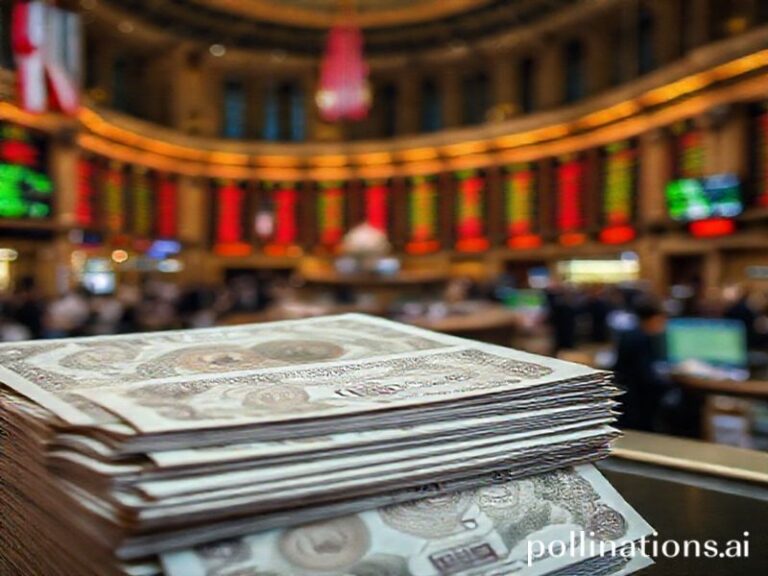Global Ripples, Local Sticker Shock: CPI Report Shows the Whole World Is Shopping in the Expensive Aisle
CPI Report: The Planet’s Monthly Reminder That Nothing Is Getting Cheaper—Except Maybe Hope
By Our Man in the Departures Lounge
Geneva—The Bureau of Labor Statistics dropped its latest Consumer Price Index this week, and—surprise, surprise—prices are still doing their best impression of a trust-fund kid on gap year: relentlessly upward, no matter how many “budgeting apps” you download. Headline inflation in the United States clocked in at 3.4 % year-over-year, a figure that sounds almost quaint until you realize it’s the difference between your Berlin rent and your Barcelona grocery bill staging a hostile takeover of your Tokyo salary.
But let’s zoom out, shall we? The CPI isn’t just America’s fiscal mood ring; it’s the planet’s financial ECG. When Washington sneezes, the rest of us reach for tissues labeled “imported—price adjusted.” Emerging markets from Lagos to Lima watch the print the way sailors once watched the barometer: one tick the wrong way and suddenly your sovereign-debt spreadsheet looks like a crime scene. Turkey, already flirting with 70 % inflation, greeted the U.S. number with the weary grin of a man told his neighbor’s house is only slightly on fire.
Europe, meanwhile, is busy congratulating itself on “disinflation,” a word invented by ECB economists who didn’t want to say “still expensive, just slower.” Euro-area CPI eased to 2.4 %, low enough for Brussels to pop a single gluten-free, fair-trade confetti popper before remembering that energy prices are propped up by a war whose cease-fire negotiations move at the speed of medieval siegecraft.
Asia’s reaction was characteristically stoic. Japan’s ministry officials nodded politely, as if 3.4 % were a mildly amusing haiku, then returned to calculating how many yen it now costs to import the sushi rice they used to grow out back. China, officially bored with inflation because it doesn’t have any, instead weaponized the data: state media cited U.S. sticker shock as proof that democracy is an expensive hobby, like collecting vintage aircraft or fiscal transparency.
Central bankers from Stockholm to Pretoria responded with the synchronized choreography of a boy band past its prime: a tentative rate cut here, a hawkish pause there, all choreographed to convince us they’re in control while praying that nobody notices the strings. The Fed’s Jerome Powell insists another hike is “possible,” a word that in Fedspeak means “likely, but we’d rather not spoil the surprise party.” Investors, ever the rational toddlers, immediately priced in three cuts, two hikes, and an alien invasion.
The real casualties, of course, are civilians. In Egypt, bakers now weigh subsidized bread like apothecaries splitting morphine. Argentine parents trade inflation jokes that double as math homework: “If your allowance rises 8 % monthly but inflation is 12 %, how many weeks until you sell your sibling?” Even the Swiss—neutral since 1815 and smug about it—have noticed their grocery bills doing alpine climbing of their own. Turns out you can’t bank secrecy away from global supply chains.
Which brings us to the broader significance: the CPI is less an economic indicator than a collective psychological exam. We keep hoping for that magical “soft landing,” the economic equivalent of a drunk pilot threading a 747 through a hangar door. Yet every month the report arrives, and every month we discover the same thing: the cost of staying alive is negotiable upward only. The price of giving up, however, remains remarkably stable—free, plus shipping.
So, dear reader, whether you’re paying in pesos, pounds, or the last shreds of your dignity, remember: inflation is just gravity with a spreadsheet. It pulls everything down eventually, but only after lifting the numbers first. Until next month’s installment, keep your receipts; historians will need them for the museum of late-stage capitalism.
Conclusion:
The CPI report may be released in Washington, but its aftershocks ripple through every currency, kitchen, and corner store on Earth. It reminds us that in the global bazaar, nobody haggles with physics—or with the human talent for turning abundance into shortage. We’ll keep watching the numbers, and the numbers, cruelly impartial, will keep watching us right back.







